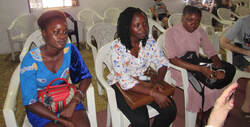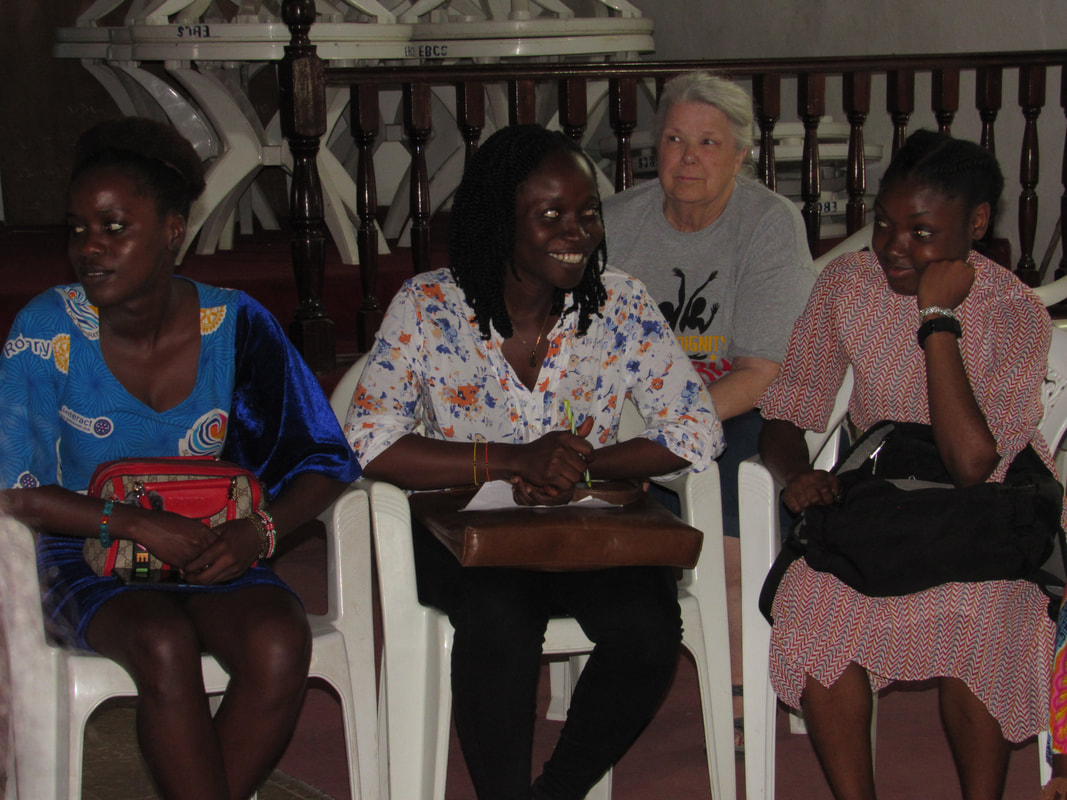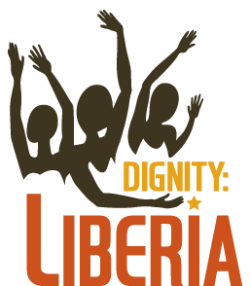
While we were in Liberia this past February, we joined Steven Stauffer, Gender Coordinator for Peace Corps/Liberia, to hold a menstrual cup distribution which included an educational component. Most of the young ladies in attendance were college students and better educated than the rural fistula survivors we encountered. Still, they recalled having to figure things out on their own, or with the help of a female relative - typically an older sister, and not really understanding what was happening to their bodies. They spoke of missing school as well. All too often, this can start a downward spiral that ends with a young girl dropping out of school. Fortunately, this was not the case with the menstrual cup distribution attendees.
Even though this group of young ladies already knew what to expect each month, the educational piece included lessening the taboo of speaking about the woman’s monthly cycle, and provided an opportunity to ask questions that had not yet been answered. The presentation also included instruction on how to use and maintain the menstrual cups. With proper care, they can last up to 10 years, so this can be a huge money-saver.
I interviewed three of the young ladies in attendance.

Kathy Beth: Good morning. Please tell me your name and what school you attend.
Charlyn: I’m Charlyn Chor and I’m a student at Mother Patern College of Health Sciences.
Kathy Beth: And why are you here today?
Charlyn: So, we’re in this club called Girl Up and we have one of the clubs in Mother Patern. So Shennel E.P. Henries, she’s our regional leader, she told us to come to the program because it would be related to menstrual cup hygiene. So, we are here.
Kathy Beth: Have you ever had to miss school when you had your period?
Charlyn: That was long time ago, yeah before this whole pads and tampons thing. When I first received my menses, I didn’t know what it was. Because most of our parents don’t talk to us about these things. So, we had to learn it on our own. So, I just saw this pile of blood coming out and I decided to see my older sister. But I was a little afraid because I thought I had hurt myself. So, I went to up her and she told me about it. But it was like a Thursday, so the next day I had these cramps but I didn’t know it was for that reason. So, she told me not to go to school, that I should take pain tablets. And that’s all I remember, really.”
Kathy Beth: Thank you very much.
Shamella E. Matthews
Kathy Beth: Good morning. Please tell me your name and what school you attend.
Shamella: My name is Shamella E. Matthews and I attend the Mother Patern College of Health Sciences.
Kathy Beth: So, um, have you ever had to um, miss school because you were having your period?
Shamella: No, but I had to leave school because I was having my period. Like, I was in class and I didn’t really know how to handle the cramps because nobody told me about it, and the pain was so severe that I was laying and I couldn’t move. And they had to take me out of campus. And it was then that my grandmother came and even my mom didn’t know what to do. My grandmother came and she was like, “Why are you suffering the child? Give her this, give her that. Yeah. And from there …
Kathy Beth: All right. Thank you very much.
Tobi A. Ajay
Kathy Beth: Good morning.
Tobi: Good morning.
Kathy Beth: Please tell me your name and what school you attend.
Tobi: My name is Tobi A. Ajay and I am at United Methodist University.
Kathy Beth: And what courses are you studying? What is your major?
Tobi: I am studying sociology as major.
Kathy Beth: And why are you here today?
Tobi: I’m here to learn more about the menstrual cups.
Kathy Beth: Did you ever have to miss school because of your period?
Tobi: Yeah, sometimes, especially when I was in high school.
Kathy Beth: Who explained how the woman’s body works? Was it your parents?
Tobi: Yes, my mother.
Kathy Beth: So, when you had your first period did you understand what was going on?
Tobi: No, I didn’t really understand what was going on. I had to ask her questions and that was how she explained to me.
Kathy Beth: Thank you very much.


 RSS Feed
RSS Feed